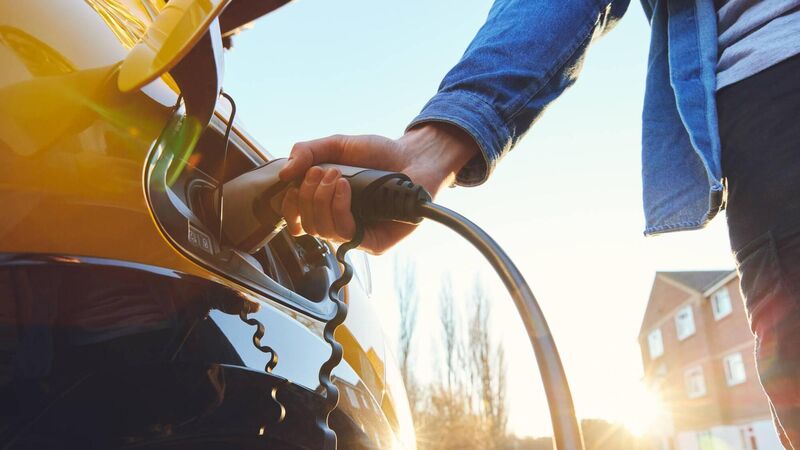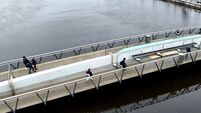‘Cork has to boost its charging points to meet EV demand’

You can now get the SEAI PV grant aid of €600 towards an EV charger, even when you don’t own a BEV or PHEV. If you are having solar electric installed, your supplier may be able to handle this on the same day. Picture: iStock
CORK'S electric vehicle (EV) infrastructure will have to grow rapidly in the coming years as manufacturers are set to ramp up the volume of EVs coming through the Port of Cork, according to a spokesperson for one of Cork’s largest car dealers.
Jackie Dawson, head of communications, and environmental sustainability governance (ESG) with Kearys Motor Group, in Cork said the infrastructure could certainly improve, particularly in relation to the fast-charging EV points.
“We are recommending to all our customers to get a home charger in place,” said Ms Dawson. Ideally, drivers would charge their vehicles on a timer at night, but not all drivers own their own property or have access to roadside parking.
Ms Dawson said Cork could do with more public charging points. Many EV drivers would be happy to pay for their parking spaces. The ESB has imposed a tariff of €1 if you park more than 46 minutes.
“This stops people blocking and going away for the day.” Ms Dawson said it was her personal opinion that those who park their internal combustion engines (ICE) in EV parking bays should be subject to an increased penalty.
A company called Ionity has fast-chargers in Cashel and Dublin, meaning a person travelling from Cork can charge their battery to 80 percent in about 20 minutes on the Hyundai Ioniq, albeit for a slightly higher price. This equates to an 80 per cent tank of fuel for €38.
“A lot of manufacturers, like BMW and Hyundai, they will negotiate a special rate. Rather than paying 71c per kilowatt, you could be paying 25c per kilowatt,” said Ms Dawson.
Fast charging is “crucial” for new EV drivers, said Ms Dawson. With Ionity, drivers get up to 100 per cent in 40 minutes, compared to six hours plus for a normal charger.
The blue charger at a Supervalu in Kinsale would get you to 80 per cent in 40 or 50 minutes, said Ms Dawson.
Read More
Is the infrastructure in Cork up to national standards?
“It’s not bad. In a lot of the Supervalu car parks – the ESB have upgraded theirs to a fast and slow, so there will be two chargers. The Ionity is super-fast. Lidl and Aldi are putting in ‘free for customers’ and that’s to be encouraged.”
The days of ‘range anxiety’ for EV drivers - avoiding long drives in remote west-of-Ireland locations due to lack of charging points, is over, according to Ms Dawson.
“A lot of hotels are putting them in now, for residents only. I think EV drivers wouldn’t mind paying them in their hotel bill. They don’t expect free electricity.
“So much has to do with a mindset of planning and experience. I’ve been driving an EV now for two or three years. It becomes second nature. With newer batteries you have longer range of 400 to 500 kilometres. Gone are the days when you would only get a little over 200.”
Are EVs a hazard to pedestrians and cyclists given that they omit almost no sound?
As a parent, Ms Dawson said she is aware of her surroundings around Kinsale or Cork city, and drives carefully, “just to alert pedestrians”.
With over 1,350 chargers island-wide, Cork city and county would have a “proportionate amount of ESB public chargers”, said a spokesperson for ESB.
“We expect most people to continue doing a majority of their charging at home where it is the cheapest and most convenient to do so. The increasing driving range of electric vehicles coming to the market will also change the use of public charging. We are already seeing a more 'layered' choice of EV charging options evolve including charging at home, at work, at destinations such as supermarkets and hotels, while the government has also provided funding to enable more local authorities to install EV chargers “ESB has invested €50m over the past 10 years plus in establishing and operating the public charging network. Included in this is a recent investment of €20m to expand and enhance the charging network across Ireland and is part funded by the Government’s Climate Action Fund. This investment in the network is helping to meet the charging requirements of electric vehicles today and for the coming years.
added the spokesperson.







 App?
App?


